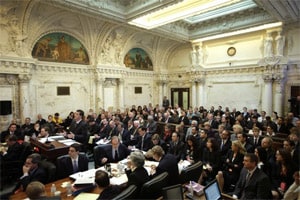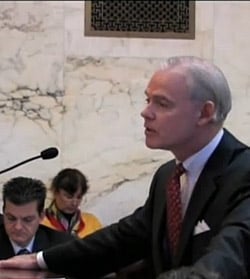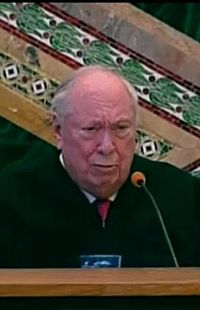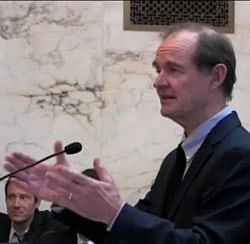Mr. Cooper comes back for the second hour to discuss the merits of the case and he did a capable job given the problems with his argument. He made a lot of points — that Supreme Court precedent from 1972 governs here, that it was rational for California voters to restrict marriage rights and that it did not matter for the proposition's constitutionality that it was taking away a right that had been previously recognized by the California Supreme Court.
It is hard to imagine that Mr. Cooper really thinks those are strong arguments. First, a lot has changed since 1972, especially in the realm of gay rights — think Romer v. Evans and Lawrence v. Texas. Second, the 1972 case was not about sexual orientation discrimination in marriage; it was about sex discrimination. There is a host of literature on this point (too much to summarize here), but suffice it to say, it makes the cases quite different.
Third, Mr. Cooper's only reason for denial of marriage rights to gay couples was the state's interest in maintaining social structures that foster procreation. But, the Supreme Court long ago divorced procreation from marriage. It did so when it allowed single people the right to contraception; it did so when it granted the right to marry to mixed-race couples; it did so when it granted prison inmates the right to marry; and so on. Ted Olson pointed to "at least 14 cases" where procreation was never considered a rational basis to restrict marriage rights from people who couldn't procreate.
Fourth, Judge Reinhardt was skeptical of Mr. Cooper's suggestion that it doesn't matter that Prop 8 took away a right that existed before. That was the case in Romer, where Colorado voters took away the right for gays and lesbians to seek anti-discrimination protection from city and state legislatures. It existed before, it didn't after. "How is this different from Romer"? Judge Reinhardt asked. Mr. Cooper danced around this point with a fascinating twist. He, unlike every other attorney who argues against gay rights, expanded the holding in Romer — he made it broader, more all-encompassing — to suggest that the problem in Romer was not the taking away of a single right (which is what Prop 8 did re: marriage), but "made gays and lesbians strangers to the law" by taking away their access to all rights through the state legislature. This argument has merit as a distinguishing feature of the cases, but it does not mean the cases should come out differently. Romer did not hinge on the quantity or quality of rights taken away, which is Mr. Cooper's point. It hinged on the fact that the only reason for taking away whatever rights Colorado voters took away from gays was that they simply did not like gay people. And, mere distaste for a particular minority group on some moral ground is not a sufficiently rational basis to uphold the law.
Mr. Cooper also kept returning to his emotional argument, most likely because he knows that his legal argument is lacking. Six times, he repeated some form of the belief that an unelected judiciary should not be allowed to overturn the will of the people. Okay. Let's join that debate with the Anti-Federalists if you want, but the mere fact that our judiciary has the power of judicial review — where courts can invalidate legislation — means that, as a matter of law, the role of the judiciary is to sometimes reject the will of the people when that will conflicts with the Constitution. Mr. Cooper's argument has no legal merit, but it has emotional heft. It is, after all, what the anti-Judge Walker protests have been about (well, that, and Judge Walker's sexual orientation).
 The response from Ted Olson carried few surprises. He made his argument about the evolution of marriage over the years and the inapplicability of the 1972 case Mr. Cooper used. He spent too much time on his own emotional argument — "these people love each other" came up a few times, for example — but his legal arguments were spot on. He danced around the question of rational basis, though. The rule is that a law will be upheld under rational basis review if there is any rational reason for it. It cannot be attenuated or not related, but it can be any real rational reason. The implication there is that judge because Judge Walker, in the district court opinion, went through all the given rationales for Prop 8 and found them lacking (with evidence, by the way), there still could be a real, specific rational reason waiting out there, and as long as the court found it, it would be ok to uphold Prop 8. Mr. Olson responded by reminding the court that any rational reason might be the rule, but it cannot be unrelated, it has to be specifically related to the law and it has to actually be furthered by the law. There is nothing further by Prop 8 other than base discrimination against gay people.
The response from Ted Olson carried few surprises. He made his argument about the evolution of marriage over the years and the inapplicability of the 1972 case Mr. Cooper used. He spent too much time on his own emotional argument — "these people love each other" came up a few times, for example — but his legal arguments were spot on. He danced around the question of rational basis, though. The rule is that a law will be upheld under rational basis review if there is any rational reason for it. It cannot be attenuated or not related, but it can be any real rational reason. The implication there is that judge because Judge Walker, in the district court opinion, went through all the given rationales for Prop 8 and found them lacking (with evidence, by the way), there still could be a real, specific rational reason waiting out there, and as long as the court found it, it would be ok to uphold Prop 8. Mr. Olson responded by reminding the court that any rational reason might be the rule, but it cannot be unrelated, it has to be specifically related to the law and it has to actually be furthered by the law. There is nothing further by Prop 8 other than base discrimination against gay people.
But then came a fascinating question. Does a state like California, which has domestic partnerships in an "everything but" marriage regime, have less of a reason to restrict marriage from gay couples than a state that has no union rights for gay couples? Or, does an "everything but" marriage state have more of a rational reason to ban gay marriage than, say, Alabama, which has no sexual orientation anti-discrimination law, no gay state-wide leaders and no civil unions. If you play chess, you can see three steps ahead here and what this means. If a state like California does done "everything but" marriage, it has said that there is really no reason why gays should not have the right to be together and do everything we let straight couples do. We just want to keep the name for religious, moral or tradition reasons. But, those reasons are insufficient to deny access to the institution. On the other hand, a state that has denied all rights to gays has kept its justifications for discrimination. A conservative state has said that gay unions should not be recognized for whatever reason; a pro-gay state has said gay couples should be together, which means they have no reason to keep them apart. It would then be easier for the conservative state to make its rational basis argument. Remember, all we need is one rational reason. When a state goes so far as to say "everything but" marriage, it is pretty much admitting that it sees no reason to keep gay couples apart.
Notice the consequence: If that is the case, then civil unions are a rest stop on the way to gay marriage. It is the slippery slope that Justice Scalia worried about in Lawrence and what opponents of civil unions bloviate about.
But, you can also answer the question the other way. A state that has "everything but" has made a calculated decision about marriage. It is pro-gay, there is no anti-gay bias in this state because it grants gays all sorts of rights. So, the impermissible bases for a law under rational basis — animus toward gays — cannot be the reason an "everything but" state has denied marriage to gays. On the other hand, an anti-gay state that has denied gays all sorts of rights is more likely to have done so because it simply dislikes gays and wants to discriminate against them.
WATCH THE FULL HEARINGS HERE.
Questions:
When will we hear?
Not for a while. The average time it takes for an appellate court to issue a decision is about 3 months. The Ninth Circuit is particular back logged, so it may be longer.
What are the possible outcomes?
There are many. The court could deny standing. Or, the court could assume standing for the purposes of reaching the merits. If the court denies standing, the prop 8 proponents could give up and that would end the case. But, that is unlikely. They would likely ask for an en banc rehearing (basically, another hearing like we had yesterday, but before about 11 Ninth Circuit judges) and if they lose there, they can appeal to the Supreme Court. If the court assumes standing and decides the merits, that decision is likely to be overturned at the Supreme Court.
Can we marry once the court decides?
No. Only if the Prop 8 proponents are denied standing and then give up will marriage equality come back to California quickly. Even after the Ninth Circuit decision, we would likely have to wait a few days for official entry of Judge Walker's order.
Ari Ezra Waldman is a 2002 graduate of Harvard College and a 2005 graduate of Harvard Law School. After practicing in New York for five years and clerking at a federal appellate court in Washington, D.C., Ari is now on the faculty at California Western School of Law in San Diego, California. His areas of expertise are criminal law, criminal procedure, LGBT law and law and economics. Ari will be writing biweekly posts on law and various LGBT issues.
Follow Ari on Twitter at @ariezrawaldman.
 Oral arguments in the Prop 8 case took place yesterday in San Francisco. We heard from the proponents of Prop 8, represented capably by Charles Cooper, and a deputy clerk from Imperial County, represented less than capably by Robert Tyler. Then we heard from David Olson and Ted Boies (no, wait, strike that, reverse it, sort of) — David Boies and Ted Olson — capably representing marriage equality. Mike, Andy and Corey ran a successful live blog of the hearing, available now here, and asked me and Richard Socarides to join. Check it out and see what happened.
Oral arguments in the Prop 8 case took place yesterday in San Francisco. We heard from the proponents of Prop 8, represented capably by Charles Cooper, and a deputy clerk from Imperial County, represented less than capably by Robert Tyler. Then we heard from David Olson and Ted Boies (no, wait, strike that, reverse it, sort of) — David Boies and Ted Olson — capably representing marriage equality. Mike, Andy and Corey ran a successful live blog of the hearing, available now here, and asked me and Richard Socarides to join. Check it out and see what happened.
Today, I would like to take a step back, dot the i's and cross the t's, and see what we heard, what we didn't hear and determine what is likely to happen next. In short, as with many appeals, it is hard to handicap. These cases are won on the briefs, you can really only lose at oral argument. We heard tough questions from all three judges to both sides and we saw all attorneys dance around questions they really didn't want to answer. But, we did hear one thing clearly — at least two judges' questions suggest that they do not think anyone has standing to appeal.
 First, we heard Mr. Cooper argue that the Prop 8 proponents — a group of California citizens who organized the Prop 8 campaign — have standing. At one point he admitted that he "had no case" to support his position that individual citizens could take the place of the state, but later he cited a New Jersey case where the attorney general and governor decided not to appeal a ruling they didn't like. What Mr. Cooper ignored was that the people who wanted to take the place of the governor in New Jersey were not individual citizens, but the speaker of the New Jersey legislature and the President of the Senate. As elected members of state government, they are in a qualitatively different position than a simple voter, under current Supreme Court precedent. Mr. Cooper knows this, of course, but his case is weak here.
First, we heard Mr. Cooper argue that the Prop 8 proponents — a group of California citizens who organized the Prop 8 campaign — have standing. At one point he admitted that he "had no case" to support his position that individual citizens could take the place of the state, but later he cited a New Jersey case where the attorney general and governor decided not to appeal a ruling they didn't like. What Mr. Cooper ignored was that the people who wanted to take the place of the governor in New Jersey were not individual citizens, but the speaker of the New Jersey legislature and the President of the Senate. As elected members of state government, they are in a qualitatively different position than a simple voter, under current Supreme Court precedent. Mr. Cooper knows this, of course, but his case is weak here.
Then, we heard that the attorney representing the deputy clerk of Imperial County does not know how clerks are put in office, the relationship between his client and the rest of the California government and how that impacts his client's standing argument. A deputy clerk of Imperial County wants to step in to the shoes of Governor Schwarzenegger and Governor-Elect Brown to take over the official defense of Prop 8. But, her attorney, Robert Tyler, could not sufficiently establish for the court why someone in her position — who answers to a different state authority and who does not even speak for the actual clerk of Imperial County — should be allowed to do so. Mr. Tyler seemed unprepared — he did not even know if the clerk is elected! — and Mr. Cooper was probably thankful he reserved a few minutes of his time for rebuttal.
 David Boies had to deal with the first interesting question of the day. Judge Reinhardt noticed a difference between the Prop 8 situation and other cases involving ballot measures and defending laws that state governments decline to defend themselves — in many of those cases, there was either a state law that allowed someone to take the place of the governor or those wanting to defend the law asked for permission to do so (or, to add the distinction I mentioned earlier, they were actually members of state government, but that clearly cannot apply here). In California, though, we don't know what the law is. These Ninth Circuit judges are primary in interpreting federal law, not state law. So, when a question of state law comes up, the court can certify a question to the state supreme court and ask them, "hey, we don't know what your law is, can you help us?" Judge Reinhardt wanted to know why the court should not just ask California what the state law is in this case.
David Boies had to deal with the first interesting question of the day. Judge Reinhardt noticed a difference between the Prop 8 situation and other cases involving ballot measures and defending laws that state governments decline to defend themselves — in many of those cases, there was either a state law that allowed someone to take the place of the governor or those wanting to defend the law asked for permission to do so (or, to add the distinction I mentioned earlier, they were actually members of state government, but that clearly cannot apply here). In California, though, we don't know what the law is. These Ninth Circuit judges are primary in interpreting federal law, not state law. So, when a question of state law comes up, the court can certify a question to the state supreme court and ask them, "hey, we don't know what your law is, can you help us?" Judge Reinhardt wanted to know why the court should not just ask California what the state law is in this case.
Mr. Boies was up to the challenge and correctly answered that it really wouldn't matter. Sure, you can go ask, but even if the California Supreme Court said it was possible under state law for the proponents of a ballot measure to stand in the shoes of the governor, "that wouldn't be enough, it would be necessary, but not sufficient." He meant that regardless of the answer to Judge Reinhardt's hypothetical question, anyone seeking standing has to have a real, direct and particularized injury — some court has to order them to do something they don't want to do. And, that has not happened here. The Prop 8 proponents were not asked to do anything, only the State of California was asked to start giving marriage licenses to same-sex couples. Judge Hawkins picked up on this right away, agreed and tied a bow on it.
 We also heard Mr. Boies take an interesting strategic turn with respect to the scope of Judge Walker's ruling. Mr. Boies said that the injunction against Prop 8 only covered Alameda and Los Angeles counties (where the plaintiffs are from) rather than the whole state. That seems counterintuitive to gay rights advocates and some lawyers who saw the ruling as declaring Prop 8 unconstitutional. But, there are strategic reasons for Mr. Boies to make this decision. He does not want the Ninth Circuit or Judge Walker to be accused of overreaching in any way. Remember the hoopla over Judge Virginia Phillips's worldwide injunction of Don't Ask, Don't Tell. The government's main argument against it is that she overreached and exceeded her authority. The injunction should be limited to her jurisdiction, the government argued. Here, Mr. Boies does not want a similar overreach argument to be made. He wants to give no one a reason to reverse. Plus, he has in his back pocket a governor-elect who is pro-marriage equality. Governor-Elect Brown could take Judge Walker's injunction to state court and ask the state judiciary to extend the ruling to all counties. It seems a bit arcane and a bit unnecessary, but it is always best to suggest to those reviewing a decision you like that it is a really narrow decision.
We also heard Mr. Boies take an interesting strategic turn with respect to the scope of Judge Walker's ruling. Mr. Boies said that the injunction against Prop 8 only covered Alameda and Los Angeles counties (where the plaintiffs are from) rather than the whole state. That seems counterintuitive to gay rights advocates and some lawyers who saw the ruling as declaring Prop 8 unconstitutional. But, there are strategic reasons for Mr. Boies to make this decision. He does not want the Ninth Circuit or Judge Walker to be accused of overreaching in any way. Remember the hoopla over Judge Virginia Phillips's worldwide injunction of Don't Ask, Don't Tell. The government's main argument against it is that she overreached and exceeded her authority. The injunction should be limited to her jurisdiction, the government argued. Here, Mr. Boies does not want a similar overreach argument to be made. He wants to give no one a reason to reverse. Plus, he has in his back pocket a governor-elect who is pro-marriage equality. Governor-Elect Brown could take Judge Walker's injunction to state court and ask the state judiciary to extend the ruling to all counties. It seems a bit arcane and a bit unnecessary, but it is always best to suggest to those reviewing a decision you like that it is a really narrow decision.
We also heard in this hour tough questions from all the judges to both sides. Lots of publicity before the argument centered on how conservative Judge Smith was (in a Google search, 8 of the first 10 articles described him as either a "Mormon" or a "conservative Mormon") or how liberal Judge Reinhardt was ("the most reversed judge in history"). But, from his questions, it appeared that Judge Smith was the least likely to grant standing to the proponents and all the judges thought the deputy clerk was just wasting the court's time.
These things are always hard to handicap, but I take this as a strong indication that the panel will unanimously deny standing to the Prop 8 proponents and the deputy clerk of Imperial County.
For analysis of the second hour, which included a discussion of the actual merits of the case, continue reading AFTER THE JUMP…



